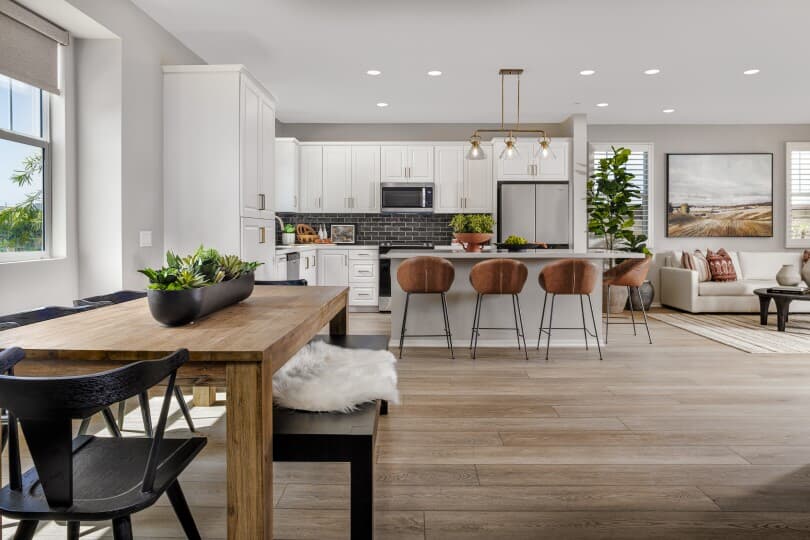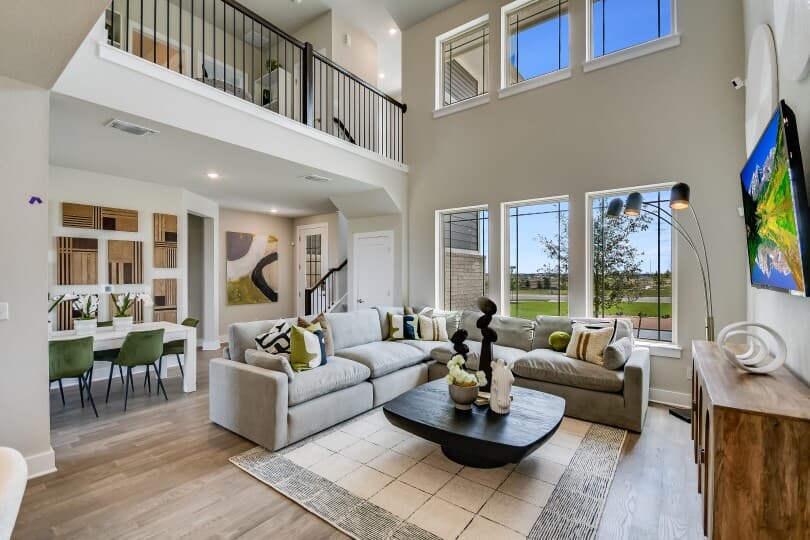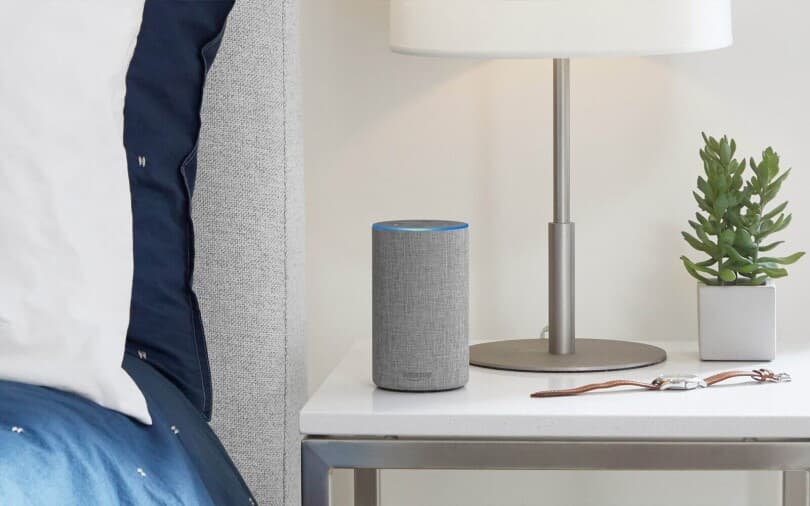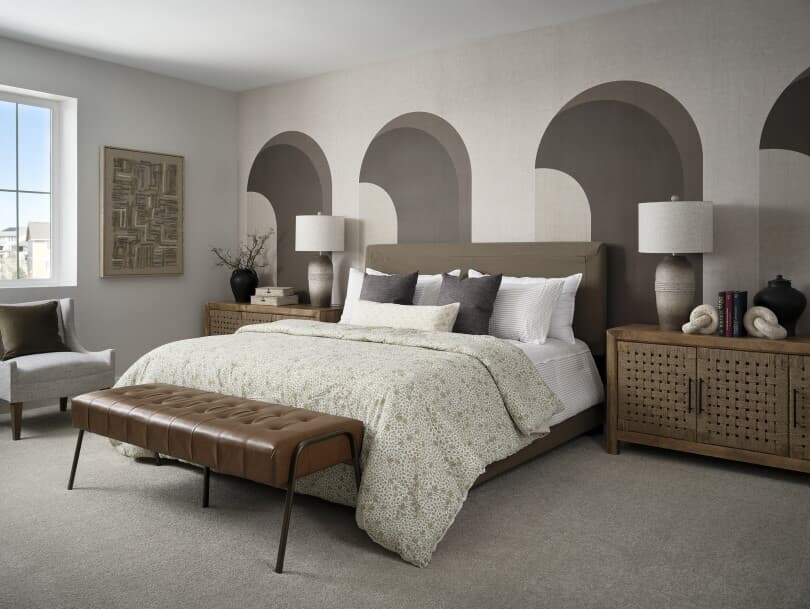Should You Invest in Smart Home Devices?

What once seemed like a futuristic luxury is not becoming a common must-have in modern homes. As technology continues to evolve, the appeal of smart home systems extends beyond convenience. Whether it’s lowering your energy costs through automated climate control or enhancing your security with real-time monitoring, smart home devices offer practical benefits that are hard to ignore.
If you’re wondering if smart home technology is worth the investment, this guide will help you better understand the value these devices can bring to your home, your wallet, and your peace of mind.

Residence 2 Floor Plan, Dwell Collection, New Haven Community, Ontario, California
What is a Smart Home?
A smart home is a residence equipped with internet-connected devices that automate and control various household functions, such as lighting, heating, security, and entertainment systems. These devices can be managed remotely through smartphones, voice commands, or central hubs, allowing homeowners to monitor and adjust the settings for comfort, convenience, and energy efficiency.
Are there different levels of Smart Homes?
Yes! There are different levels of “smartness” you can implement in your home, depending on the complexity of the system and your desired level of integration.
Basic Level
If you’re new to smart home technology, you may want to start with individual, easy-to-use devices, like smart locks, video doorbells, or a smart speaker, to get a feel for the benefits of the technology without committing to a fully integrated setup.
At a basic level, these devices are manually controlled and work independently from each other through an app. You’ll have the convenience to improve your daily tasks without requiring a significant investment in technology or time spent managing complex integrations.
Intermediate Level
If you’re a more tech-savvy user and want to expand beyond basic devices, an intermediate-level smart home may be better suited for you. You can customize your settings, create routines, and control multiple systems (like lighting, heating, and security) from a central platform like Amazon Alexa, Google Home, or Apple HomeKit.
Advanced Level
For someone who wants complete home automation, integration across a wide range of devices, and the latest in smart technology, an advanced-level smart home may be the right choice for you. These homes are designed to anticipate your needs by adjusting the lighting based on the time of day, changing the thermostat according to weather patterns, and opening your blinds first thing in the morning. An advanced-level smart home combines convenience, comfort, security, and energy efficiency with a high degree of customization.

Columbia Floor Plan, Urban Courtyard Homes Collection, Easton Park Community, Austin, Texas
Benefits of Smart Home Technology
While it’s cool and fun to show your friends how you can change your lights, close the blinds, and turn on music from your phone, smart home technology has plenty of practical benefits, too!
1. Convenience & Automation
One of the biggest perks of smart home technology is the ability to control it even when you’re away from your home. You can adjust your settings, check your systems, and activate devices no matter where you are.
If you have a set schedule or daily routine, you can automate your home to meet your needs, such as turning on the lights in the morning, locking your doors at night, or adjusting the thermostat on your drive home.
2. Energy Efficiency & Cost Savings
Smart appliances have programming and learning features that can save money on your energy costs. A smart thermostat can learn your schedule and adjust your heating and cooling automatically or be easily turned on or off when you’re away from home.
Smart lighting can be automated to turn off lights in empty rooms or adjust the brightness based on natural light levels. Smart plugs can be used on almost anything, allowing users to monitor and control energy usage by turning off appliances when not being used, preventing “vampire” energy drain.
3. Enhanced Security
Smart home security systems allow you to check on your home from anywhere and access the controls from afar. Motion sensors and alarm systems can be integrated into a smart system to detect unusual activity, notify you if something is detected, and trigger a siren or lighting.
Security cameras and video doorbells allow for real-time video monitoring and alerts, letting users see and communicate with someone on the property. A smart lock allows homeowners to monitor their door locks remotely, receive notifications when a door is opened, and create a temporary access code for visitors or service providers.
4. Increased Comfort & Accessibility
Smart home devices help you tailor your home to your preferences or respond to other triggers, such as time of day, adding convenience and comfort to your daily routine. Do you want your home at your perfect temperature when you come in after a long day at work? Creating an automated routine makes this happen without you even thinking about it. One less thing on your to-do list sounds pretty nice, doesn’t it?
Users can easily control their home environment without ever moving from their spot by using voice commands or an app on their smartphone. This remote ability is especially beneficial for individuals with mobility challenges or disabilities, as they can easily automate tasks like unlocking doors, turning on lights, and controlling appliances.
5. Peace of Mind
Our lives seem busier than ever, and it can feel like we’re juggling many things at once. With our minds in constant multi-task mode, it can be easy to wonder, “Did I lock the front door on my way out?” Smart home technology allows users to tap into their home from anywhere, allowing them to check if you closed the garage door, set the security system, and keep an eye on visitors.
Beyond security, smart home technology can also provide peace of mind when it comes to our health. Smart air quality monitors can track the levels of pollutants and allergens inside your home. Smart water leak detectors can alert you to unusual water usage and help prevent mold growth and water damage. Smart air purifiers not only clean the air but also track the quality in real-time, adjusting their settings to keep your home free of dust, allergens, and other harmful particles.
Popular Smart Home Devices
As the world becomes increasingly reliant on technology, our homes are no different. The modern home is now an experience designed to unlock a higher level of convenience and security. The best smart home devices can easily automate your home, make you feel safer, and even help you save money.
1. Smart speakers and virtual assistant
Smart home devices have apps for Android and iOS devices, making them compatible with most mobile devices and tablets. If home automation is the sundae, think of voice assistants as the cherry on top. Voice assistants allow you to seamlessly control your smart home devices using verbal commands through one smart home platform.
2. Smart light bulbs
Smart light bulbs are one of the most affordable devices on the market, making adjusting your lighting more convenient and customizable than ever before. Smart bulbs contain software that connects to an app, smart home assistant, or other smart accessories so you can automate your lights or control them remotely – eliminating the need for traditional wall switches.
3. Smart thermostats
A smart thermostat is a thermostat that can be controlled with a phone, tablet, smart speaker, or other internet-connected devices. Smart thermostats can offer a variety of features beyond remote access to adjust your home's temperature.
4. Home security cameras and video doorbells
Both home security cameras and video doorbells allow you to see what’s happening at your home remotely. Video doorbells are outdoor cameras that may or may not be hardwired into your existing doorbell setup. You receive notifications whenever the doorbell is pressed, or activity is detected near your front door giving you the opportunity to monitor or communicate with anyone on your property.
Home security cameras let you see what’s going on at home while you’re away. They can usually be installed inside and outside your home, depending on where you want visibility. Often, they can be connected to full home security systems.
5. Keyless entry and remote garage access
Whether it’s your front door or the garage, entering and exiting your home without keeping track of keys and clickers has its benefits. But the benefits of these smart devices extend beyond easy access – you can remotely monitor accessibility so you can be sure you closed the garage door and locked the front before you left for the day.
6. Smart smoke and carbon monoxide detectors
There’s nothing quite as annoying as the chirp of your smoke detector, and it inevitably seems to happen in the middle of the night. By swapping out your traditional smoke and carbon monoxide detectors for smart ones, you receive notifications directly on your phone when they need attention.
7. Smart blinds
Smart blinds let you control the light and privacy in a room, no matter where you are. Imagine opening your window blinds every morning without getting out of bed or watching your coverings close automatically when the sun sets.
8. Smart irrigation
Water is our most precious resource, and if you’re in an area experiencing a drought, it’s even more important to be mindful of your water usage. A smart irrigation system will save water, time, and money.
Smart irrigation systems allow you to adjust your watering schedule through an app and automatically adjust based on local weather or ground moisture levels. In most cases, smart watering technology can be installed on your existing irrigation system, cutting your water usage by 20 – 40%.
9. Smart appliances
Smart home technology has evolved to include appliances within your home. Refrigerators are by far one of the most popular and advanced smart appliances. Many have a tablet-like screen built into one of the doors, which can serve as a memo board or a grocery list you can write directly on your fridge!
Smart refrigerators don’t deserve the entire spotlight, however. Other kitchen appliances, including microwaves, dishwashers, and ovens, can be controlled remotely. You can easily start the oven preheating while finishing another task.
Beyond the kitchen, appliances such as your washer and dryer have the capacity for smart features. While they’re not able to fold and put away your laundry (at least for now!), you can start, stop, check status, and receive end-of-cycle notifications on your phone.
10. Smart plug
A smart plug is a great workaround to take your “dumb” appliance and make it smarter. For example, take your favorite table lamp, connect it to the smart plug, plug it into the wall, and presto, you can control your lamp from your phone. You can set schedules for the plugs to turn on and off, as well as link them to other smart home devices.
To better understand what is possible for your home, check out our Homebuyers Guide to Smart Home Technology.

Are Smart Home Devices Worth It?
While your home can function just fine without smart home devices, many have benefits that can’t be ignored. The programming and learning features found on devices that control heating, cooling, refrigeration, and other energy-consuming systems can save money on your energy bills. These small adjustments can add up to big savings in your household expenses over time.
A smart security system that protects your home can provide neighborhood monitoring, potentially lower your home insurance premiums, double-check things you may have forgotten, and, of course, deter burglars.
Beyond the financial savings, smart home technology can provide peace of mind and convenience. Knowing your home is secure, being alerted to potential issues in real-time, and having the convenience that comes with the automation of everyday tasks takes away the stress of forgetting or needing to be home to check on things. For many homeowners, that’s priceless.

Artisan Four Floor Plan, Artisan Portfolio, Barefoot Lakes Community, Firestone, Colorado
Brookfield Residential Smart Home Technology
Turning your home into a smart home may seem daunting, but it doesn’t have to be! When you buy a new home from Brookfield Residential, it comes with included myCommand smart home technology.
With the flexibility of choosing an Amazon, Apple, or Google device, you can have access to your home anytime and anywhere. By incorporating these features as standard, we ensure a seamless user experience from day one and beyond.
Available features*
- Keyless entry and remote garage access
- Smart lighting
- Programmable thermostat
- Device-compatible voice assistant (Alexa, Siri®, or Google)
- Advanced wiring for reliable connectivity
*Smart home features vary by location. Contact your local sales team for more information.
At Brookfield Residential, we are committed to creating and innovating the best places to call home – and this is just the beginning. Be sure to explore where we build and contact us to learn more. We’ll be expecting you!

